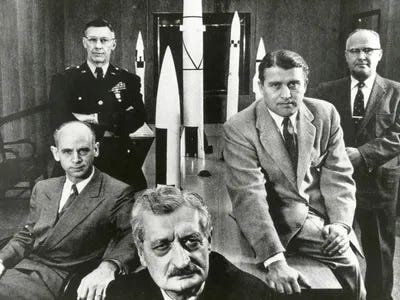As World War II in Europe was approaching its end in 1945, American and Soviet generals jockeyed to claim for their countries the largest share of the spoils of defeated Germany. The Soviets eyed equipment and machinery that might rebuild their broken industrial plant. Troops of the Red Army dismantled and packed onto trains factory materials that had survived Allied bombings and ground operations.
The Americans didn't care about German machinery, having plenty of their own in Detroit and Pittsburgh. Instead they sought the people who designed the machinery and the weapons it produced. Of particular interest were the scientists and engineers of the German rocket program, the most advanced in the world.
In what came to be called Operation Paperclip, American operatives located and spirited out of Germany some sixteen hundred of the experts responsible for the V1 and V2 rockets that had punished Britain and threatened to turn the tide in Germany's favor.
The operation was closely held. The Americans didn't want to alert the Soviets, who eventually conducted a similar program of their own. Nor did the United States government wish to publicize that it was giving special treatment to men who might have been charged with war crimes for the rocket attacks against civilian populations. Many of the German scientists and engineers had been members of the Nazi party, some decorated by Adolf Hitler himself.
For their part, the German rocketeers were happier to fall into American hands than into Soviet. The fighting had been more painful on the eastern front than the western. The Soviets had scores to settle with the Germans. Besides, such German scientists as Albert Einstein had migrated to America before the war and become successful and respected. The German rocketeers might hope for similar results for themselves, once the passions of the war died down.
Operation Paperclip played out much as both the Americans and Germans desired. Werner von Braun rose to head the program that built the Saturn V rocket responsible for the Apollo launches that put men on the moon. Before he died, von Braun received the highest American awards for science and engineering.
The effort the United States made to bring the best German technical minds to America during the Cold War is worth remembering today, when American policies are having the effect of an Operation Paperclip in reverse. Beginning in the first Trump administration and continuing until now, scientists in America with Chinese connections have been viewed suspiciously, to the degree that many have forsaken the United States for China. Large cuts in federal grants to universities have caused many researchers to seek more reliable funding in other countries. Recently the administration told Harvard University it would not be allowed to enroll foreign students. Whether the goal of administration policies is to prevent the world's brightest researchers from working in America, or this is simply the consequence of the policies, the result will be the same. Rather than leverage American talent and resources with keenest minds and hungriest ambitions from other lands, America will be left to its own devices.
These have never been sufficient to produce the standard of living Americans learned to take for granted. In every generation, American technical and economic progress has rested on minds and ideas from abroad. Samuel Slater smuggled textile technology from Britain to America in the late 18th century. America in the 19th century welcomed the Scottish family of Andrew Carnegie, who returned the favor by making America's steel industry the champion of the world. America became Einstein's refuge in the 1930s and that of the German rocketeers in the 1940s and 1950s. The emergence of Silicon Valley in the 1970s and after was a triumph of cosmopolitanism, so that today four of the seven CEOs of America's biggest tech firms are immigrants.
Some Americans might be willing, in the name of making America great again, to cut the country off from the rest of the world. But that's not how America became great in the first place. There's little reason to think it will work now.




I used to love this McLuhan quote until someone pointed out the flaw. “In our electric age it is knowledge that supersedes experience. It is knowledge that got us to the moon not experience.” The flaw someone pointed out to me was if knowledge supersedes experience then explain all the German rocketeers who worked for NASA.
They called it Operation Paperclip because they literally placed a paperclip on the personnel files of the more ‘problematic’ scientists.